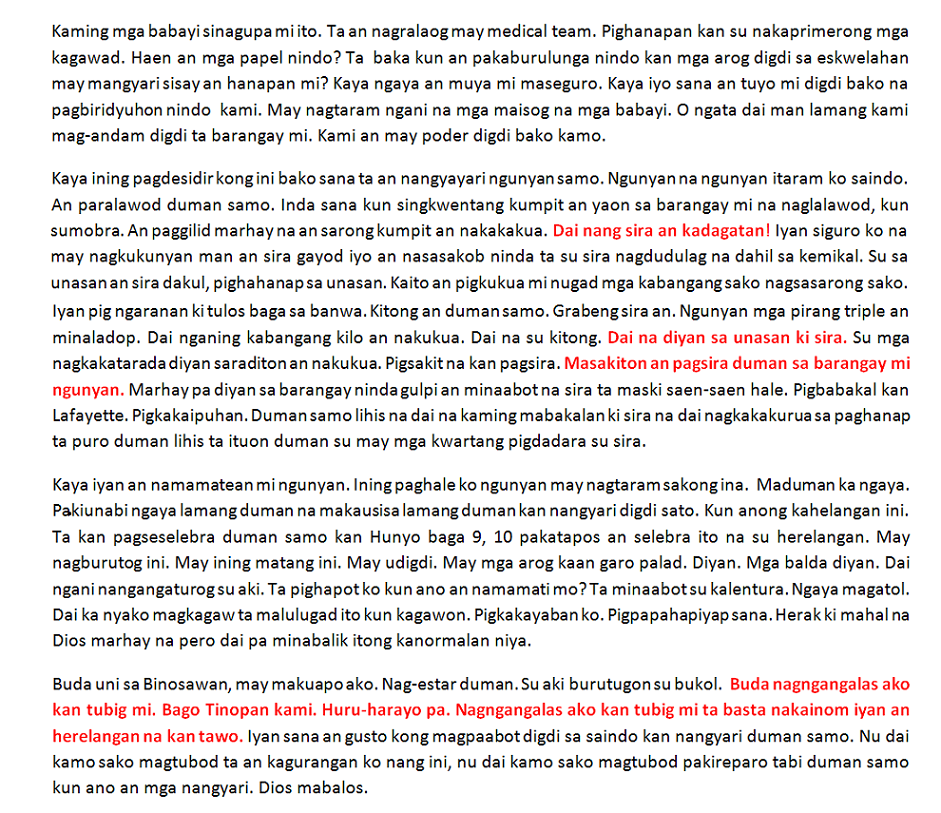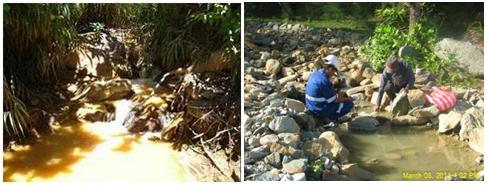by Kan Yang | Category: Stories | |
The Michigan Independent
11 February 2008
At 4:00 AM on October 3rd, 2006, Bishop Alberto Ramento was lying asleep at his convent in San Sebastian, Tarlac City. A Supreme Bishop of the Philippine Independent Church, Ramento was known for his tireless efforts to uphold workers’ rights and fight for the poor and oppressed. He suddenly felt a biting pierce to his body; “thieves” crept in and left him with seven brutal stab wounds. Ramento staggered out of his bedroom, but was too deeply wounded. The next morning, the police would claim that a robbery-homicide was the cause of his murder, the thieves apparently targeting a $10 used DVD player he owned.
Three months prior, a pounding was heard at a house in Barangay San Miguel, Hagonoy. Armed men in military uniform forcibly took Sherlyn Cadapan and Karen Empeño, two students from the University of the Philippines, and threw them into a service vehicle bound for a nearby town. Earlier, Sherlyn had accompanied Karen to the barangay (village) to help collect testimonials and data for her senior thesis on the plight of the peasants in the countryside. After their abduction, eyewitness accounts from a military camp testified that they were possibly raped and tortured. The image of their faces now scar the collective consciousness of the Filipino people; two more names to be added to the shameful list of the “disappeared.”
Such occurrences have been commonplace in the Philippines over the past few years. Under the banner of George W. Bush’s “War on Terror,” President Gloria Macapagal-Arroyo has instituted Oplan Bantay Laya (“Freedom Watch”) in her country with the expressed purpose of counterinsurgency. However, like the loose definition of the “War on Terror”, the “insurgents” identified by Oplan Bantay Laya have been members of worker’s unions, student activists, leaders of human rights organizations, and other individuals deemed a threat to the Arroyo government. According to a report by Karapatan, a human rights organization, the Armed Forces of the Philippines (AFP) and their paramilitary collaborators have been responsible for 16,307 human rights violations in 2007 alone. Karapatan notes that these have included extra-judicial executions, involuntary disappearances, torture, forced evacuations, and other gross injustices. Many are done furtively at night; still others by day. University of Michigan Lecturer Maria Barrios notes that hired hands by the military, dressed as civilians, would carry out motorcycle drive-by shootings on people deemed “enemies of the state.” On October 10th, witnesses saw Alano Clerigo forcibly taken by elements of the Scout Rangers Company under the 1st Scout Ranger Battalion in Barangay Menchaca, Negros Occidental. As a “subversive” member of the local peasant’s organization championing for better working conditions, he was burned, slashed, mauled, castrated, and then buried alive. Seventeen days later, Luicito Bustamante was abducted, only to surface on November 14th after a judge ordered his presentation in court. His testimonial revealed that the AFP, trained and well-versed in torture tactics by the U.S. military, coerced him into eating his own feces and suffocated him by a plastic bag wrapped around his head. The justification by the military for carrying out such heinous acts: the victims are members of the Communist Party of the Philippines or other “leftist” organizations working to destabilize the “free” government.
Yet, these crimes against humanity are not going unnoticed. Many parallels are being drawn between the current state and the U.S.-backed repressive regime of Ferdinand Marcos in the 1980’s. During his tenure in office, the country was marred by rampant corruption and political mismanagement, exacerbated by rampant political killings and the constant looting of funds from the treasury. Hardened from the experience of combating the Marcos regime, similar measures are being taken by Filipino and other human rights organizations to raise awareness of these atrocities. At a conference in The Hague, Netherlands on March 26th, 2007, the Permanent People’s Tribunal declared the governments of Gloria Macapagal-Arroyo, George W. Bush, and their collaborating multinational firms guilty of trampling down Philippine sovereignty by plundering the country and oppressing its people. In a press release, the Tribunal further condemned the actions of the government in allowing widespread U.S. military and economic intervention, hindering the peoples’ right to self-determination by baselessly labeling them as “terrorists.” On September 22nd, 2005, Diosadado Fortuna, the union leader for Nestle, was murdered for fighting the exploitation that the Nestle management exacted upon its workers. The Kilusang Mayo Uno labor center, in response, declared September 29th as the National Day of Protest and Indignation and motivated workers to leave the factories to mourn his death. Their actions provided a strong front of solidarity and protest.
On Rapu-Rapu in Albay Province, the Australian firm Lafayette has been plundering huge profits off of extracting precious metals from the island. With the benefits of Arroyo-backed tax cuts, Lafayette earns an average of $1.3 billion annually by strip-mining the land with complete disregard for the environment. Filipino news magazine Bulatlat notes five instances within the last two years, the most recent being November 6th, 2007, where pollution has caused the fish around the island to be poisoned, of which the inhabitants depend on for their livelihood. As the 10,000 residents lay hungry, their protests have garnered the attention of the larger community, with their starved bodies a bitter statement of the hardships they faced.
These are just merely a few of the countless documented and undocumented incidents perpetrated by the Arroyo administration. Yet, the activists keep on fighting with unwavering resolve. Looking towards an uncertain future, they are moved by the words of the late Bishop Ramento to “find courage and confront the darkness that is engulfing the very soul of the [Philippines] and continue to tread the path towards the establishment of a just society under a government that genuinely serves the interest and welfare of the Filipinos.”
What you can do:
• Start an information campaign. Arkibong Bayan, an organization dedicated to justice in the Philippines, documents the ongoing abuses by the government and provides a wealth of information on the subject through their website atwww.arkibongbayan.org. Barrios has authored the book “Battered Bodies, Ravaged Lives: Women and the Culture of Militarism in the Philippines” and co-edited “Subverso,” both of which provide a personal perspective to the extra-judicial killings. Encourage discussions using these references in your political science, law, Asian studies, sociology, or women’s studies class.
• Sign the online petition at http://citizenspeak.org/node/1187, which persuades your congressperson to support H.R. 2764, a bill that opposes U.S. military funding and personnel being used for these killings. Ask your colleagues: do you want billions of your tax dollars to be used for purchasing bullets to mow down innocent people?Aid the fundraising campaigns of Karapatan. The Writ of Amparo is a powerful tool used by the Filipino judicial system to force the military to surface an abducted individual, dead or alive. However, each case costs $300, and funds are greatly needed to continue these searches.
• As an alternative to Nestle products, support the “Truffles for Activists” campaign by volunteering to make or sell truffles: this fund strives to keep activists in the Philippines alive and safe.
































































































































No comments:
Post a Comment